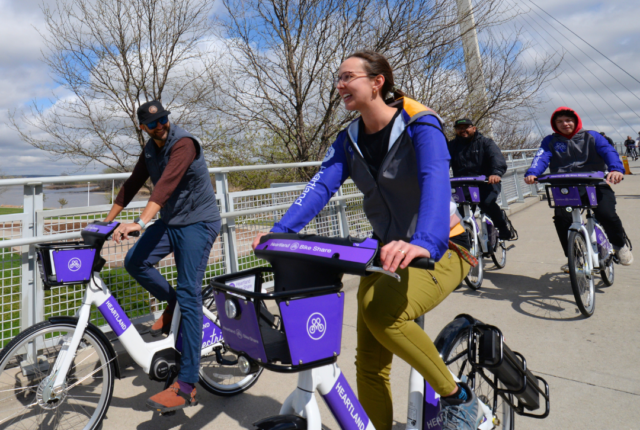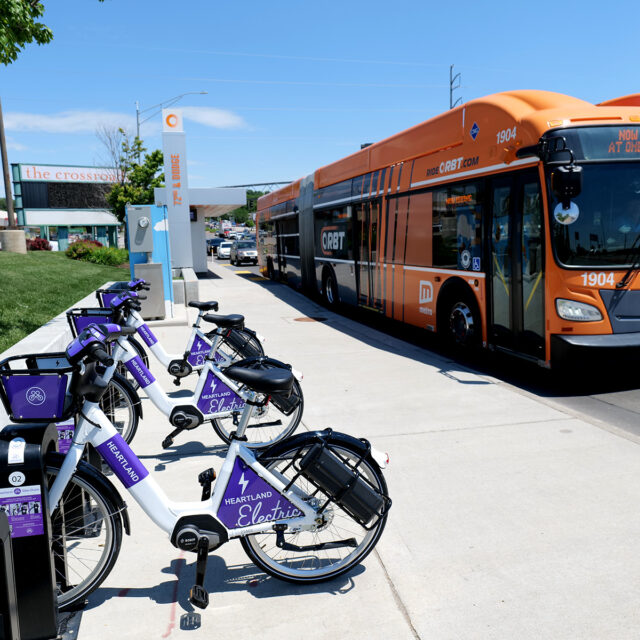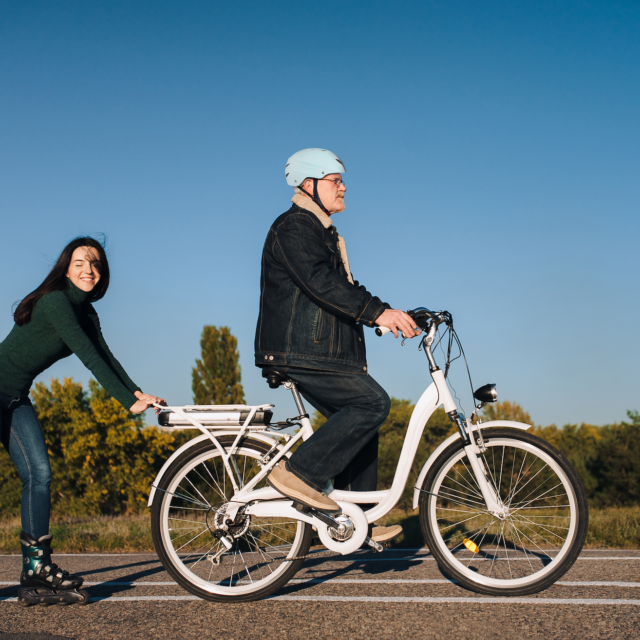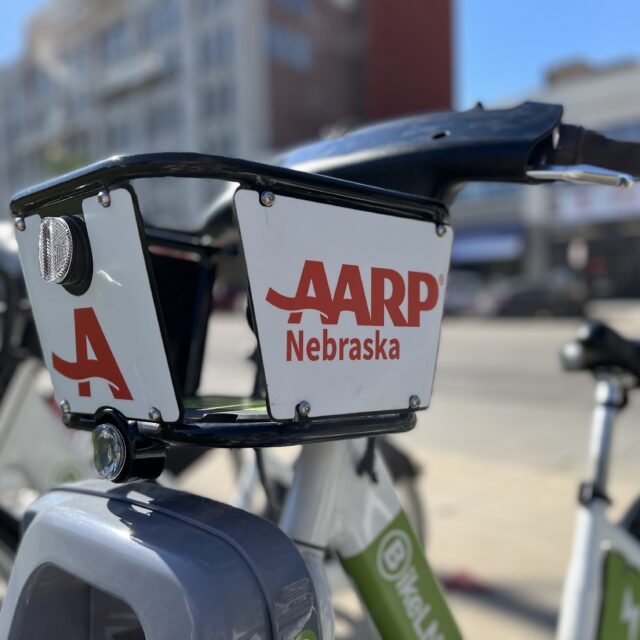The Heartland Goes Electric
by Kiran Herbert, Communications Manager
July 5, 2023
Bike share in Omaha, Nebraska, has always prioritized equity — the system’s recent decision to convert to all e-bikes is an extension of that work.

Heartland Bike Share Executive Director Benny Foltz (left) takes part in a community ride.
Benny Foltz, the executive director of Roam Share, the nonprofit that oversees three bike share systems in Nebraska, first started riding his bike out of necessity. Having lost his driver’s license, Foltz biked for transportation, managing to stay mobile and get where he needed to go on time.
“I’ve been homeless, jobless, carless, and incarcerated, and the bike has always been a reliable vehicle,” says Foltz, who at one point worked at eBay, where he attempted to start an internal bike share program. “I quickly noticed the benefits of biking over driving and started to share this ‘biking’ concept with everyone.”
Because of his background and deep understanding of the bicycle as a tool for essential mobility, Foltz has always prioritized equity programming in the systems he oversees, the largest of which is Heartland Bike Share in Omaha. In addition to a robust Library Pass Program — which makes bike share memberships available to check out at 13 libraries in Omaha — Heartland offers a partner pass program, which provides more than 20 local nonprofits that work with underserved communities free annual bike share memberships. Last year, Heartland provided more than 5,000 free bike share trips through these two programs.
Foltz’s firsthand experience with how difficult it can be to procure gainful employment with a colorful criminal history also means that Heartland practices equitable hiring. The system partners with two other nonprofits to help provide job options in shared micromobility for those reentering society from being incarcerated.
Somewhat uniquely, Foltz has long seen electric bikes as a crucial component of Heartland’s equity offerings. The idea to incorporate e-bikes into the system first arose when he tried a demo e-bike from BCycle for the first time (BCycle is the equipment provider for all of the Nebraska bike share systems). Foltz and his predecessor began taking a demo bike to meetings with funders but few would get on to try it and ultimately, they didn’t have much success in generating buy-in. It wasn’t until 2019 when the system got its first 20 e-bikes — and folks started riding them way more than the analog bikes — that Foltz was able to convince others about the benefits of an all-electric fleet (organizing a group bike ride with key funders also helped).
“Last year, I had a 50/50 split with classic/e-bikes and 95% of all of our trips were on e-bikes,” says Foltz. “All of our equity riders only wanted to ride e-bikes, so we intentionally only put e-bikes in our underserved communities, because we knew they were using them for transportation.”
From the outset, Foltz made the decision to never differentiate in price between electric and classic bikes, something of a rarity in the shared micromobility industry. In April, the entire Heartland system transitioned to completely electric, and still, pricing hasn’t changed (memberships cost $20/month and $156/year).
“I’ve been very firm from the beginning that we would never create a price difference,” says Foltz. “I would never want to charge more for an electric bike because it’s one more hurdle or barrier for someone that couldn’t afford it.”
Foltz explains that if he were to charge more, the revenue gained would pale in comparison to what the system would lose as a public sector transportation provider. As for the amount of time it takes his employees to rebalance bikes and swap batteries, he believes that a 100% electric system doesn’t require more work — plus, it’s significantly easier than maintaining a split system. It’s also less confusing for his customers, who clearly prefer electric bikes.
“Riding a classic bike for transportation is no longer fun — it feels like slow motion,” says Foltz. “There’s a need for transportation and the e-bike is facilitating that need in a way the bus, ride share, or a personal vehicle can’t. Bike share means you don’t have to worry about maintaining, purchasing, or locking up your own e-bike — plus, you get some fresh air, a little bit of exercise, and it’s fun.”
The Better Bike Share Partnership is funded by The JPB Foundation as a collaboration between the City of Philadelphia, the National Association of City Transportation Officials (NACTO), and the PeopleForBikes Foundation to build equitable and replicable bike share systems. Follow us on LinkedIn, Facebook, Twitter, and Instagram, or sign up for our weekly newsletter. Have a question or a story idea? Email kiran@peopleforbikes.org.



